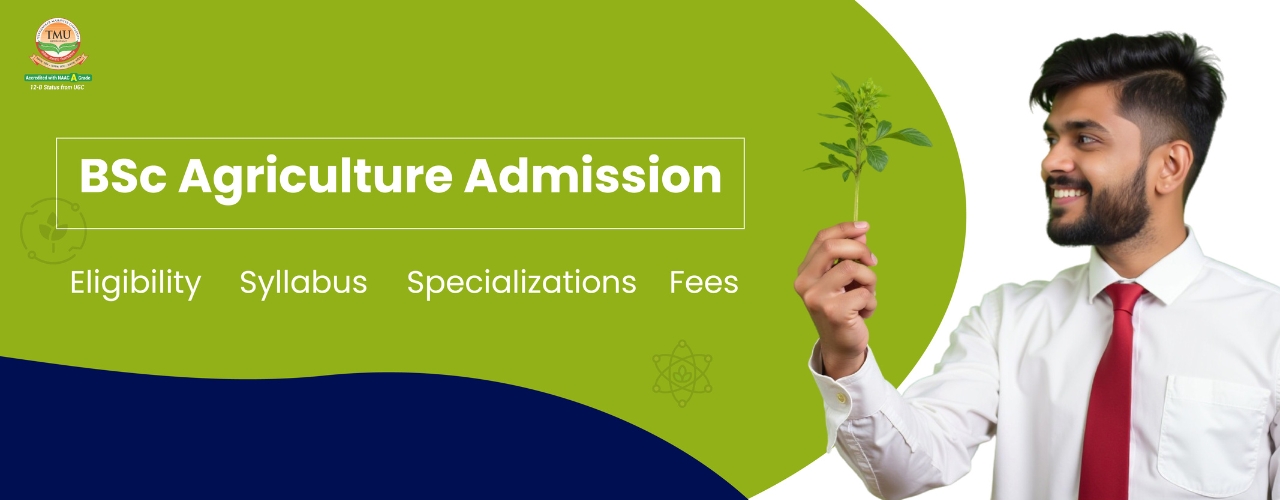BSC Agriculture Admission: Eligibility, Syllabus, Specializations and Fees
Table of Contents
If you are planning a career in the agricultural sector, pursuing BSc Agriculture admission can be a smart choice. This four-year undergraduate program provides comprehensive knowledge of agricultural science, including modern farming techniques, soil management, plant breeding, agronomy, and animal husbandry.
The BSc Agriculture admission process opens the gateway to a comprehensive programme that blends theoretical learning with practical exposure. The curriculum ensures students gain hands-on experience with modern agricultural technologies while building strong scientific knowledge. Through BSc Agriculture admission, students develop expertise in improving crop productivity, enhancing soil health, and advancing sustainable farming practices. This programme prepares graduates for rewarding careers in agriculture, agribusiness, and allied sectors.
Given the increasing demand for sustainable farming and agribusiness, a BSc in Agriculture provides access to a wide range of career opportunities in both the public and private sectors.
BSc Agriculture Overview
| Feature | Details |
| Course Name | Bachelor of Science in Agriculture (BSc Agriculture) |
| Course Level | Undergraduate |
| Duration | 4 Years |
| Eligibility | 10+2 (Science stream with Physics, Chemistry, Biology/and Mathematics) |
| Admission Process | Merit-Based or Entrance Exam-Based |
| Popular Entrance Exams | ICAR AIEEA, CUET, State-Level Entrance Exams |
| Specializations | Agronomy, Horticulture, Soil Science, Plant Pathology, Agricultural Economics, etc. |
| Top Colleges | GB Pant University, Punjab Agricultural University, Tamil Nadu Agricultural University, etc. |
| Average Fees | ₹20,000 - ₹1,50,000 per year (varies by college) |
| Career Options | Agricultural Officer, Agronomist, Farm Manager, Research Scientist, Agri-Entrepreneur |
| Higher Studies Options | MSc Agriculture, MBA in Agribusiness, PhD in Agriculture |
| Salary Range | ₹3 LPA - ₹8 LPA (varies by experience and job role) |
Teerthanker Mahaveer University
Apply for Admission
Click Here To Apply for Admission
Why Choose BSc Agriculture?
BSc Agriculture is an excellent choice for students passionate about farming, agribusiness, and sustainable agriculture. With the global population rising, food security is a major concern, making agriculture a high-demand industry. Here’s why you should consider pursuing a BSc in Agriculture:
1. Growing Career Opportunities
Agriculture is the backbone of many economies, including India. The government is actively promoting agricultural development through schemes and subsidies, creating numerous job opportunities for graduates.
2. Diverse Specializations
From agronomy to biotechnology, students can specialize in various fields within agriculture, allowing them to pursue careers in research, business, or fieldwork.
3. Contribution to Food Security
Agricultural professionals play a crucial role in ensuring the availability of food through advanced farming techniques, pest control, and soil conservation.
4. Entrepreneurial Prospects
With knowledge of modern farming, graduates can start their own agribusiness, organic farming venture, or agricultural consultancy services.
5. Government Job Security
BSc Agriculture graduates have a high chance of securing government jobs in the agriculture department, research institutions, and public sector banks.
Eligibility Criteria for BSc Agriculture Admission
To get admission into a BSc Agriculture program, students must meet specific eligibility criteria.
Educational Qualifications
- Candidates must have completed 10+2 or equivalent from a recognized board.
- Science stream students with Physics, Chemistry, Biology/and Mathematics are eligible.
- Some universities accept students from the Agriculture stream in 10+2.
Age Limit
- The minimum age requirement is 17 years at the time of admission.
- Some universities have an upper age limit of 22-25 years, but it varies.
Entrance Exams
While some universities offer merit-based admission, many require students to qualify for entrance exams such as:
- ICAR AIEEA(Indian Council of Agricultural Research All India Entrance Examination)
- CUET(Common University Entrance Test)
- State-Level Entrance Exams(KEAM, AP EAMCET, MP PAT, etc.)
BSc Agriculture: Admission Process
There are two main ways to secure admission in BSc Agriculture program:
1. Merit-Based Admission
- Some colleges offer admission based on 12th-grade marks in the science stream.
- A merit list is prepared based on candidates' performance in their board exams.
2. Entrance Exam-Based Admission
- Many reputed agricultural universities require students to qualify for an entrance test.
- Candidates must apply for exams like ICAR AIEEA, CUET, or state-level tests.
- Admission is based on the exam score, counselling process, and seat availability.
Top Entrance Exams for BSc Agriculture
| Exam Name | Conducting Body | Eligibility |
| ICAR AIEEA | Indian Council of Agricultural Research | 10+2 with PCM/PCB |
| CUET | National Testing Agency (NTA) | 10+2 with Science |
| KEAM | Kerala Government | 10+2 with Science |
| AP EAMCET | Andhra Pradesh Government | 10+2 with Science |
| MP PAT | Madhya Pradesh Government | 10+2 with Science |
BSc Agriculture: Syllabus and Subjects
BSc Agriculture is a four-year program divided into eight semesters, covering theoretical and practical subjects.
Core Subjects in BSc Agriculture
- Agronomy(Crop Production, Soil Fertility, Water Management)
- Soil Science(Soil Chemistry, Soil Microbiology, Fertilizers)
- Horticulture(Fruits and Vegetable Crops, Floriculture, Landscaping)
- Agricultural Engineering(Irrigation Systems, Farm Machinery)
- Plant Pathology(Crop Diseases, Pest Management)
- Genetics and Plant Breeding(Hybrid Crops, GMOs)
- Agricultural Economics(Farm Management, Agri-Business)
- Animal Husbandry(Dairy Farming, Poultry Farming)
Semester-Wise Breakdown
| Semester | Subjects Covered |
| 1st Semester | Fundamentals of Agronomy, Soil Science, and Horticulture Basics |
| 2nd Semester | Crop Physiology, Organic Farming, Plant Biochemistry |
| 3rd Semester | Genetics, Irrigation Management, Environmental Science |
| 4th Semester | Plant Pathology, Livestock Management, Agri-Business |
| 5th Semester | Pest Management, Food Science, Soil Conservation |
| 6th Semester | Biotechnology, Farm Machinery, Entrepreneurship |
| 7th Semester | Research Methods, Marketing, Agricultural Extension |
| 8th Semester | Industrial Training, Project Work, Internship |
BSc Agriculture Specializations
BSc Agriculture offers various specializations to help students focus on a specific area of interest.
BSc Agriculture Specializations
| Specialization | Description |
| Agronomy | Study of crop production, soil management, and sustainable farming techniques. |
| Horticulture | Focus on cultivation of fruits, vegetables, flowers, and landscaping. |
| Plant Pathology | Deals with plant diseases, pest control, and fungal infections. |
| Soil Science | Study of soil composition, fertility management, and soil conservation. |
| Agricultural Engineering | Application of technology in irrigation, farm machinery, and agri-tech solutions. |
| Agricultural Economics | Covers farm management, agri-business, and agricultural trade policies. |
| Animal Husbandry | Involves livestock management, dairy farming, and poultry farming. |
| Agricultural Biotechnology | Use of genetic engineering, hybrid crops, and biotechnological advancements in agriculture. |
| Forestry | Study of forest ecosystems, wildlife conservation, and sustainable forestry practices. |
| Seed Technology | Focus on seed production, hybridization, and genetic improvement of crops. |
| Organic Farming | Emphasizes chemical-free, eco-friendly farming methods. |
| Sericulture | Study of silk production, silkworm rearing, and processing. |
| Dairy Technology | Deals with milk production, dairy processing, and quality control. |
| Poultry Science | Covers breeding, nutrition, and disease management in poultry farming. |
| Food Science & Technology | Study of food processing, preservation, and quality assurance. |
Top Colleges for BSc Agriculture in India
Several universities and colleges in India offer BSc Agriculture programs. Some of the top institutes include:
| S.No. | College/University | Location |
| 1 | Indian Agricultural Research Institute (IARI) | New Delhi |
| 2 | Tamil Nadu Agricultural University (TNAU) | Tamil Nadu |
| 3 | Punjab Agricultural University (PAU) | Punjab |
| 4 | Acharya N.G. Ranga Agricultural University | Andhra Pradesh |
| 5 | Teerthanker Mahaveer University | Uttar Pradesh |
These universities offer quality education, research facilities, and hands-on training in agriculture. Some other universities offer such programs.
Career Opportunities After BSc Agriculture
Graduates of BSc Agriculture have various career opportunities in both the government and private sectors.
1. Government Jobs
- Agricultural Officer– Works with farmers and promotes modern farming techniques.
- ICAR Scientist– Conducts research in agricultural sciences.
- Forest Officer– Manages forest resources and wildlife conservation.
- Banking and Rural Development Officer– Works in NABARD, SBI, and other banks providing agricultural loans.
- Food Inspector– Ensures food quality and safety in the agricultural industry.
2. Private Sector Jobs
- Agri-Business Manager– Works in agribusiness firms handling production and marketing.
- Seed Technologist– Develops high-yield crop varieties.
- Farm Manager– Manages farm operations, irrigation, and machinery.
- Agricultural Consultant– Advises farmers on modern farming techniques.
3. Higher Studies Options
- MSc Agriculture– Specialize in areas like Agronomy, Horticulture, and Soil Science.
- MBA in Agribusiness– Focus on business and management in the agriculture sector.
- PhD in Agriculture– For research and academic positions.
4. Entrepreneurship & Self-Employment
- Organic Farming– Start organic farming and export high-demand produce.
- Agritech Startups– Innovate in agriculture using AI, drones, and automation.
- Dairy Farming– Invest in milk production and dairy products.
Fee Structure for BSc Agriculture
The fees for BSc Agriculture vary depending on the institution.
| College Type | Annual Fees (Approx.) |
| Government College | ₹20,000 - ₹50,000 |
| Private College | ₹70,000 - ₹1,50,000 |
- Government colleges offer lower fees and scholarships.
- Private colleges charge higher fees but provide better infrastructure and placements.
Scholarships Available for BSc Agriculture Students
Students can apply for various scholarships to reduce their financial burden.
| Scholarship Name | Eligibility | Offered By |
| ICAR Scholarship | Merit-based | ICAR |
| National Talent Scholarship | Entrance exam qualifiers | Govt. of India |
| State Government Scholarships | State-specific students | Respective state governments |
| Jindal Scholarship | Merit & financial need | Sitaram Jindal Foundation |
| UGC Scholarships | SC/ST/OBC candidates | University Grants Commission |
Comparison Between BSc Agriculture and Other Agriculture Courses
| Course | Duration | Focus Area | Career Scope |
| BSc Agriculture | 4 Years | Broad agriculture studies | Government & private jobs, research |
| B.Tech Agricultural Engineering | 4 Years | Agricultural machinery & technology | Agri-tech industry |
| Diploma in Agriculture | 2 Years | Basic agricultural techniques | Entry-level jobs |
| MSc Agriculture | 2 Years | Advanced specialization | Research & teaching |
| MBA Agribusiness | 2 Years | Agriculture business management | Business and marketing roles |
Skills Required for BSc Agriculture
To succeed in the field of agriculture, students should develop:
- Scientific Knowledge– Understanding of soil science, crop cultivation, and irrigation.
- Problem-Solving Skills– Address farming challenges like pest control and water scarcity.
- Technical Skills– Operating farm machinery and using agri-tech solutions.
- Business & Marketing Skills– Essential for agribusiness management.
- Communication & Leadership– To work with farmers and agricultural organizations.
Future Scope of BSc Agriculture
With technological advancements in agriculture, the demand for skilled agricultural professionals is rising. Future trends include:
- Smart Farming– Use of AI, IoT, and drones for precision farming.
- Agri-Tech Startups– Innovative companies revolutionizing the agricultural sector.
- Organic and Sustainable Farming– Growing demand for chemical-free produce.
- Government Policies & Schemes– Continuous investment in the agricultural sector.
- Global Opportunities– Jobs in international agribusiness companies and research institutions.
Conclusion
BSc Agriculture is an excellent program for students passionate about farming, technology, and sustainability. With diverse career options in research, government, agribusiness, and entrepreneurship, this degree provides a stable and rewarding future. As the world faces food security challenges, agricultural professionals will continue to be in high demand, making this course a smart choice for students looking for growth, innovation, and job security.
FAQs
Q1:Is a BSc in Agriculture a good career option?
Ans: A BSc in Agriculture is a four-year undergraduate programme that opens doors to diverse career opportunities in government organisations, agricultural research, private agribusiness, and entrepreneurship. The course covers essential areas like crop production, soil science, horticulture, plant breeding, and agribusiness management, preparing students to tackle modern agricultural challenges. With increasing demand for skilled professionals in sustainable farming and food security, pursuing admission in BSc Agriculture is an excellent choice for students aspiring to build a rewarding career in the agriculture sector.
Q2:What is the average salary after completing a BSc in Agriculture?
Ans: Fresh graduates earn around ₹3-5 LPA, while experienced professionals can earn up to ₹8 LPA or more..
Q3:Can I get a government job after a BSc in Agriculture?
Ans: Yes, government job options include Agricultural Officer, ICAR Scientist, Food Inspector, and roles in NABARD and State Agriculture Departments..
Q4:What are the best entrance exams for BSc Agriculture?
Ans: ICAR AIEEA, CUET, KEAM, AP EAMCET, and state-level exams are popular for BSc Agriculture admissions..
Q5:What is the eligibility for a BSc in Agriculture?
Ans: Eligibility for BSc Agriculture requires 10+2 with Physics, Chemistry, and Biology/Mathematics from a recognized board, with a minimum of 50-60% marks (varies by university). The age limit is 17-25 years. Admission is based on merit or entrance exams like ICAR AIEEA, CUET, KEAM, AP EAMCET, MP PAT, etc..















